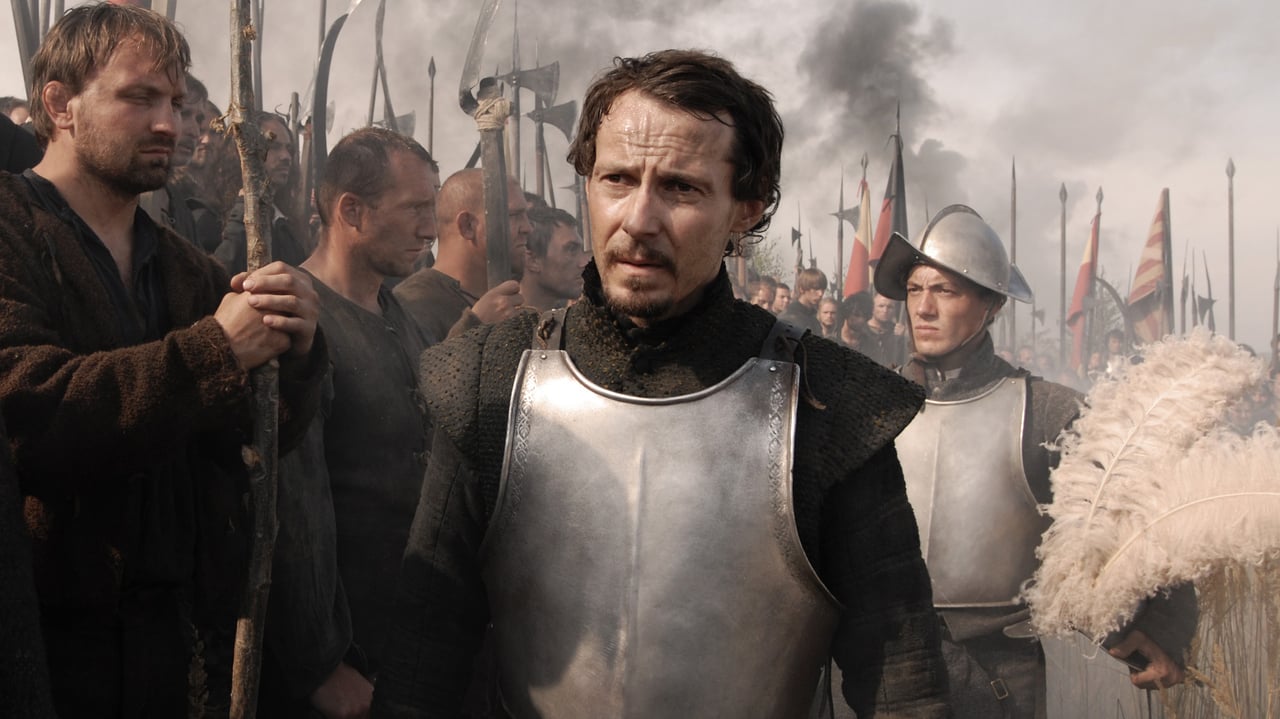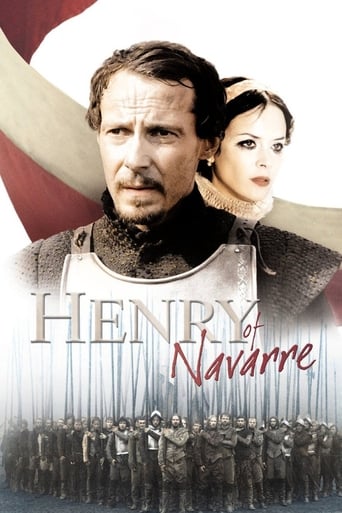



What makes it different from others?
A Brilliant Conflict
A clunky actioner with a handful of cool moments.
The plot isn't so bad, but the pace of storytelling is too slow which makes people bored. Certain moments are so obvious and unnecessary for the main plot. I would've fast-forwarded those moments if it was an online streaming. The ending looks like implying a sequel, not sure if this movie will get one
View Moreit reminds many other historical films. for recipes, solutions, mixture of bloody scenes, political secrets and the recreate of a reasonable sketch for a dark period. good performances, beautiful costumes, the hero and a good looking lead actor who, far to be the best choice for the role of Henri IV, it is a reasonable one. short, a seductive film, history "ad usum delphini", good start point for discover the roots of events. and, sure, a nice story, heroic, tragic, interesting. it is one of films with a noble purpose and a smart director who knows translate, on the taste of public, Modern history in the right images. and this is the most important virtue in this case.
View MoreHenri 4 is, as the name already suggests a biopic about the French king mentioned in the title. Biopic fits in the truest sense as the film starts with the main character as a boy and ends with his assassination. I am not sure how close it is to the Heinrich Mann novel it is based on, but it's a historic drama from 5 years ago and while it is usually not particularly my favorite genre, I was nicely entertained most of the time. Here and there there was a scene where it dragged a bit, but it was still bearable for a 2.5 hour film. It's packed with intrigue, violence, killings, sex and relationship struggles, most of these pretty graphic. These relationships involved queens, wives and, last but not least, God. There are many emotional scenes in this film. The film is written and directed by Jo Baier, a man who won several Adolf Grimme awards in the past already for his works. It is a multi-cultural movie. Many countries involved here and actors from these countries too, especially Germany and France. You may have come across Król, Pippig, Hüller, Hoger, Striesow, Markovics, Urspruch and Monot already if you are interested in German movies.Ulrich Noethen scored a supporting actor nomination at the German Film Awards for his performance here and he was certainly one of the standouts of this movie. Julien Boisselier (did not know him before) was a good choice for the lead character, but not a perfect one. All in all, the movie did not have any real moments of greatness, but no major weaknesses wither. If you like the genre, this certainly deserves a watch. Give it a chance.
View MoreAmbitious in its intentions, based on Heinrich Mann's historical novel, this movie looks apparently pretty good: it surely has a much more authentic atmosphere especially compared to the infamous 'La Reine Margot', good cinematography, and decent acting (except Charles IX). But, contrary to another reviewer who thought it too long, actually it's too short and over-simplified.The dire, murderous and suspicious atmosphere is very well realized, as many of those admired crowned heads have behaved sometimes like insane mass murderers, and luckily the glamorized feel of too many historical films has not crept in here. But the script looks rushed, hurrying and compressing events, decades, characters and their motivations. Thus, even the action is unclear for a viewer unfamiliar with that age and place, and important historical or dramatic events are but hinted at or simply omitted (the Ligue and its rebellion, the deaths of Charles IX, Henri III and of his brother, the last Valois heir, and also Caterina's death).In reality, the historical characters have been pretty complex and contradictory: Caterina was not only an evil and scheming hag such as her portrayal in Dumas' novels, but an active and courageous politician striving (mostly in vain) to maintain a fragile balance in a kingdom devastated by three rival factions (the Court, the Guise family with its Ligue, and the Huguenots led by the future Henri IV). Or Henri III, her favorite son, was indeed a weird, undecided, bisexual, perhaps bipolar fellow, but certainly not an idiot: it was him who 'eliminated' his main rival the duke de Guise and finally allied with the future Henri IV against the Ligue and named him heir presumptive. The death of Gabrielle is not elucidated in the film (was it Rosny, the king's main adviser, really? Unbelievable).Maria de Medici is treated in an infantile manner, and even the king's assassination is very poorly explained. Also lacking are many other tentatives of assassinating him throughout all his life course. The pacification of France after his last conversion and crowning took in reality many years and required much effort, from battles to bribery for rebellious dukes. By the way, the duke d'Epernon, the last standing rebel and a main mastermind of the king's assassination, is absent from this film.To sum all these up: despite its ambitious luster, strangely the film has the feel of a low budget one: too few characters, rushed situations, poorly explored motivations, quite few extras in the scenes at the Court. Which is in fact bad for a film treating such dramatic and surprising events.
View MoreTwo and a half hours well spent – if you know the history of the French Wars of Religion. If not and you think the DVD cover promises a battlefest then you may be disappointed. The one major battle scene is short and adequate but war – or how to end it - remains the background theme to this film and occupies little of the screenplay. The film is more about politics than war.As such, it is pretty faithful to the events and characters involved. Charles IX was only 23 when he died but appears older. The protagonist Henry of Navarre, one of the few French kings regarded as 'good', had a reputation for lechery and the opening scene shows our hero embarking on his lascivious path at a very young age. It also establishes his persona as a down-to-earth lover of peasants enjoying the bucolic life in his small kingdom in SW France.Standing between Henry and the French throne we have the last two Valois kings Charles IX and Henri III – childless, weak and dominated by their mother Catherine de Medici who is depicted unsympathetically as scheming and unscrupulous. History dealt Catherine a bad hand. She gave her husband Henri II 10 children in 12 years. He then got himself killed in a joust and left her to run a country where religious civil war was about to break out.Secure in her island fortress on the other side of the Channel, the childless Elizabeth I of England has been credited with preserving religious peace over the same period. Catherine's position was weaker. Effectively the ruler of France for 30 years, she desperately bought time for her sons to grow up. To complicate matters further, we have the powerful Catholic Guise family with their own ambitions for the French throne and the fact that Henry of Navarre is a Protestant in a land where the majority are still Catholic.Grappling with the French Wars of Religion is difficult enough for any history student. Making a film about this topic demands a careful balance between detail and entertainment. The screenplay includes all the main characters and events and will mainly appeal to those with some background knowledge. More battles would not have explained the story.To sum up, we have one battle, four political assassinations, a lot of rampant sex between the hero and various women, one dramatic escape, the famous St. Bartholomew's Day Massacre of Protestants and the good King Henri IV dispensing religious toleration and material well-being to his subjects. To do all this in only 150 minutes is a remarkable achievement.Inevitably, this film will be compared with the award-winning 'La Reine Margot' (1994). The Margot of 'Henri 4' is a much less sympathetic character. This film tells a different story and covers a longer time span. Of the two films, I think I prefer this one.
View More